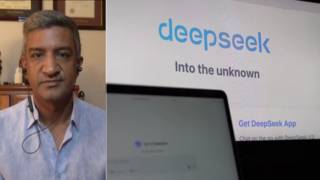
Chinese President Xi Jinping is arriving at the White House for a state visit with President Obama today, where Xi is expected to commit to implementing a cap-and-trade system to limit China’s greenhouse gas emissions in 2017. A cap-and-trade system is a market-driven strategy in which governments cap emission levels and then allow companies to buy and sell permits to pollute. We speak to Greenpeace International’s Kumi Naidoo, who recently visited China.
Transcript
AMY GOODMAN: As the pope drives away in his Fiat, you know, this very humble car, which is talked about not only for its humility but also for efficiency—you know, he was dwarfed by the big Secret Service cars around him, but insisted. As he leaves Washington, is here in New York, Chinese President Xi Jinping has arrived at the White House for a state visit with President Obama today, where he’s expected to commit to implementing a cap-and-trade system to limit China’s greenhouse gas emissions in 2017. A cap-and-trade system, a market-driven strategy in which governments cap emission levels, then allow companies to buy and sell permits to pollute. Your thoughts about this, Kumi Naidoo?
KUMI NAIDOO: Well, having just come from China four weeks ago, there is serious momentum on the ground to actually move in a positive direction. We think that this announcement is a very important significant step in the right direction. Bear in mind that China is like a continent, right? One of seven people on the planet are Chinese. And what they’re talking about is a system of disincentives for emitting carbon. And I think it’s a very workable system, and this will have huge implications. You know, the announcement that was made last year, about, you know, by 2030 they’re going to peak and so on. Already, when I was there, you saw that, of course, it’s a different political system. If something is said at the center, it’s implemented. And already you can see different states, different big cities and so on are developing serious plans to get to that. And if they don’t, there are fines, consequences and so on in terms of that system. So, I think that this is a game changer.
And I do think that it takes away the argument from those in the Republican-controlled Congress who say, “Well, China is doing nothing, China is…” So I hope that a combination of what the pope’s message was, this announcement so soon by the Chinese leadership, will urge the Republican leadership to actually look at the science and rethink the now absurd-looking denialism around the world. I mean, I have to tell you that people around the world just laugh at the Republican debates, to see the kind of—you know, the current primary debates. They cannot believe that potentially from this slate of ideas will come the new president of the United States.
JUAN GONZÁLEZ: And as we approach the—toward the end of this year, the Paris meeting, how do you—what are your hopes and expectations, coming between this United Nations meeting, which is going to have more world leaders than any in history, between now and Paris?
KUMI NAIDOO: So, the important thing that not just Greenpeace, but the broader movement has been talking about is, we mustn’t make the same mistake we made in Copenhagen. You know, we threw everything at Copenhagen in 2009 to get the “fair, ambitious and binding” deal, what we called a FAB outcome. What we got was a FLAB outcome—just “full of loopholes and bull.” Right? Now, the challenge is not—and we stopped talking about the road to Paris. We’re talking about the road through Paris. Right? And it’s a very important distinction.
What we are saying is, assuming the pope’s message, other forces joining and all gives our political leaders the courage to make the decision that they should have made six years ago in Copenhagen, but let’s say they make it now, what will be on—they will be words on a piece of paper. The struggle then—OK, now that would be the most ambitious thing, that they would, you know, go for the emission reduction cuts, make sure that we stabilize things around one-and-a-half degrees and so on. If we did all of that, in paper, if there’s agreement, there will be a huge amount of work to do to make sure it’s implemented. So therefore, right now, if you look at what’s on the table, there are few optimistic signs, but it’s way less than what the science is saying we need to do in Paris at the end of the year.
But I believe there’s a lot of momentum building up as we get there, and maybe our political leaders will do the right thing. But whether they do the right thing or not, we will. And different from Copenhagen—we had the march at the beginning of the two weeks—we will start with a march, and on the last day we will end with a march, to send a clear message to our politicians that citizens are going to be engaged. We are not going to trust you. We’re not going to actually invest faith in you. We’re going to continue to hold your feet to the fire, and continue to push, because what is at stake here is our children and their children’s future, and that’s much too precious for us to leave to politicians alone.
AMY GOODMAN: Kumi Naidoo, we want to thank you for being with us, executive director of Greenpeace International, who’s stepping down at the end of the year.













Media Options